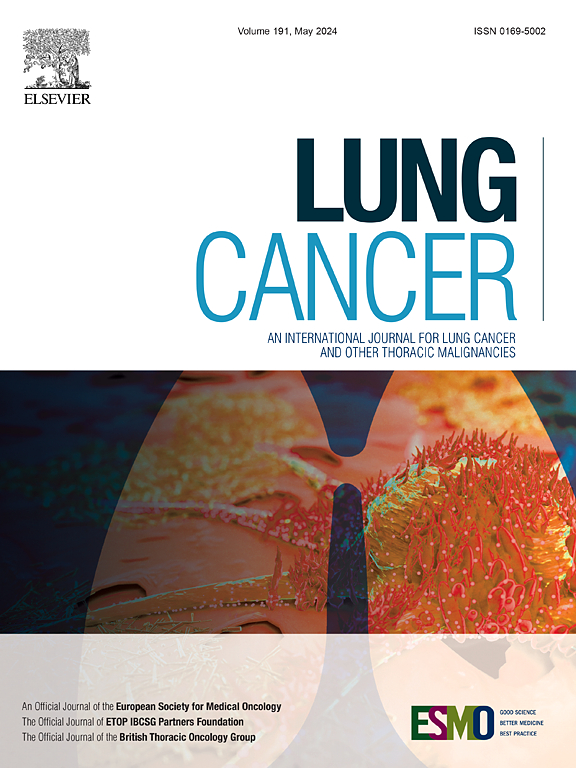获得性SMARCA4改变:肺腺癌癌症进展的不常见因素
IF 4.4
2区 医学
Q1 ONCOLOGY
引用次数: 0
摘要
smarca4失活发生在非小细胞肺癌(NSCLC)和未分化胸部肿瘤的一个亚群中,通常作为吸烟者的早期克隆改变。虽然很少观察到作为一个后天事件,频率和重要性尚不清楚。考虑到SMARCA4缺陷胸部肿瘤的侵袭性,我们假设SMARCA4失活可能代表治疗后的进展和耐药机制。材料和方法我们报告了一例手术切除的肺腺癌患者在进展中获得SMARCA4改变的病例。然后,我们对4154例具有肿瘤基因组谱的患者进行回顾性分析,确定NSCLC患者≥2测序试验。在每个时间点进一步研究具有致病性SMARCA4突变的克隆相关样本以及临床和组织病理学特征。结果在354例具有≥2个克隆相关肿瘤样本的患者中,7例(2.0%)在晚期或复发疾病的全身治疗后获得致病性SMARCA4突变。中位年龄为60岁;其中57%为女性,71%从不吸烟。在6/7(86%)的病例中发现了致癌驱动因素(EGFR、ERBB2、ROS1、KRAS和BRAF)。回顾性队列中的所有患者都接受了介入性全身治疗,酪氨酸激酶抑制剂或化学免疫治疗。在5/7的病例中,观察到SMARCA4的获得与肿瘤突变负担的增加有关,通常具有APOBEC特征。在2/7的病例中,SMARCA4获得与肿瘤分级恶化和TTF1/Napsin A表达缺失相对应。结论获得性致病性SMARCA4突变是罕见的,但可能在全身治疗压力下出现,通常伴随着TMB的增加。在某些病例中,SMARCA4表达缺失的形态学改变提示了其病理生物学意义。本文章由计算机程序翻译,如有差异,请以英文原文为准。
Acquired SMARCA4 alterations: An uncommon contributor to cancer progression in lung adenocarcinomas
Introduction
SMARCA4 inactivation occurs in a subset of non-small cell lung carcinomas (NSCLC) and undifferentiated thoracic tumors, typically as an early clonal alteration in smokers. While rarely observed as an acquired event, the frequency and significance remain unclear. Given the aggressive nature of SMARCA4-deficient thoracic tumors, we hypothesized that SMARCA4 inactivation could represent a mechanism of progression and resistance following therapy.
Material and methods
We report an index case of a patient with surgically-resected lung adenocarcinoma acquiring a SMARCA4 alteration at progression. We then conducted a retrospective analysis of 4154 patients with tumor genomic profiles, identifying NSCLC patients ≥ 2 sequencing tests. Clonally-related samples with pathogenic SMARCA4 mutations were further investigated alongside clinical and histopathologic features at each timepoint.
Results
Of 354 patients with ≥ 2 clonally-related tumor samples, seven (2.0 %) acquired a pathogenic SMARCA4 mutation following systemic therapy for advanced or recurrent disease. Median age was 60 years; 57 % were women and 71 % never smokers. Oncogenic drivers (EGFR, ERBB2, ROS1, KRAS, and BRAF) were identified in 6/7 (86 %) cases. All patients in the retrospective cohort received intervening systemic therapy, either tyrosine kinase inhibitors or chemoimmunotherapy. In 5/7 cases, SMARCA4 acquisition was observed in association with an increase in tumor mutational burden, often with APOBEC signatures. In 2/7 cases, SMARCA4 acquisition corresponded with worsening tumor grade and loss of TTF1/Napsin A expression.
Conclusion
Acquired pathogenic SMARCA4 mutations are rare but may emerge under systemic therapy pressure, often alongside increased TMB. Morphologic changes accompanying the loss of SMARCA4 expression suggest pathobiological significance in select cases.
求助全文
通过发布文献求助,成功后即可免费获取论文全文。
去求助
来源期刊

Lung Cancer
医学-呼吸系统
CiteScore
9.40
自引率
3.80%
发文量
407
审稿时长
25 days
期刊介绍:
Lung Cancer is an international publication covering the clinical, translational and basic science of malignancies of the lung and chest region.Original research articles, early reports, review articles, editorials and correspondence covering the prevention, epidemiology and etiology, basic biology, pathology, clinical assessment, surgery, chemotherapy, radiotherapy, combined treatment modalities, other treatment modalities and outcomes of lung cancer are welcome.
 求助内容:
求助内容: 应助结果提醒方式:
应助结果提醒方式:


